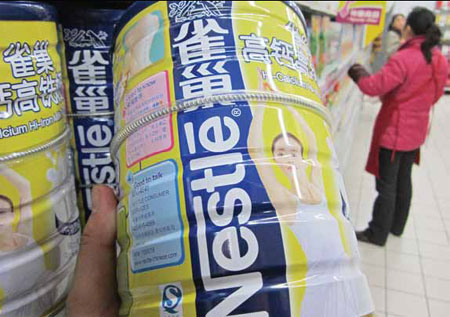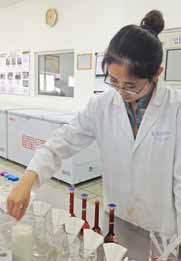Multinational finds that with milk, a local touch is best
Updated: 2012-06-22 16:55
By Xiao Xiangyi (China Daily)
|
|||||||||||
|
Nestle will set up a new dairy farming institute to educate farmers who will supply its products in the Chinese market. Provided to China Daily |
|
A technician does testing on farmers' delivery at the Shuangcheng factory. Xiao Xiangyi / China Daily |
New dairy training center aims to arm Chinese farmers with updated skills
Unlike other milk powder brands that say they use imported dairy products, Nestle SA boasts that the infant nutrition series it sells in China has purely Asian origins. By building a totally domestic milk source base, Nestle is trying to convince Chinese of its credentials.
Every day at 3 pm, Liu Cheng, a dairy farmer, and his nine farmhands milk their cows. With the latest milking technology they can fill Nestle's milk collection wagons with vats of fresh milk before sunset.
Liu's farm, which covers nearly 7,000 square meters and has more than 200 head of cattle, is a mid-sized one among the hundreds of farms in Shuangcheng county, in Northeast China's Heilongjiang province. The dairy cow industry in the county has evolved rapidly over the past 20 years as farming families far and wide have adopted modern equipment and methods in raising cows.
Most provide milk for the multinational Nestle. Although locals run most of the farms, Nestle gives them constant guidance on techniques and quality control and guarantees loans for building and running costs.
To cultivate potential and existing providers, Nestle recently announced that it was opening the Dairy Farming Institute in Shuangcheng, its biggest fresh milk supply source, where it will train dairy farmers and technicians.
Nestle obtains milk from three places in China: Shuangcheng, Hulunbeier city in Inner Mongolia autonomous region and Qingdao in East China's Shandong province. Shuangcheng is its sole source for infant formula milk powder.
In January, Nestle and the Shuangcheng government signed a memorandum of understanding under which 2.5 billion yuan ($393 million, 310 million euros) will be invested in the milk industry over the next five years through a partnership among Nestle, local government and farmers.
The Dairy Farming Institute, whose construction will be complete by the end of the year, adheres to a memorandum of understanding and will benefit farmers, says Heiko Schipper, managing director of Nestle China's food and beverage division.
The institute, covering 600,000 sq m, will be a showcase for cow feeding and breeding and farming management. This will be done in two different types of training areas: A cow farm with 1,520 head of cattle will provide practical guidance for farmers on small farms to transform into a professionally managed large farm; and a large farm with 1,200 cows and another with 8,000 cows will help those who own larger farms increase the size of their facilities and use more modern practices.
For the program, Nestle has signed agreements with industry leaders including Land O' Lakes, Alta and East Rock Ltd, which have expertise in grass planting, cow breeding and pasture design and management. Experts from these companies may serve as teachers in the institute.
"Similar dairy farming institutes can be found in other countries like the US," says Martial Genthon, executive vice-president technical of Nestle China.
"Land O' Lakes, one of our partners, has a lot of knowledge accumulated in the US," Genthon says.
The program will educate farmers on improving milk quality and output and raising healthier cows through the feed they are given, he says. It will also introduce farmers to world-class dairy breeds and the most advanced technologies. Farmers will also learn about medicating their herds, and will be offered specialized veterinary support when required.
The training courses are expected to have 700 participants a year.
"There is a lack of competent and professional talent (to) manage the large farms, which is relatively a new trend in China," Genthon says. "The institute will certainly help improve the fact and accelerate the transformation from individual small farms to large-scale ones."
Schipper says: "China is an exciting market that everyone is looking into, especially when there is a baby boom in the Year of the Dragon. The increase, though it should not be overestimated, is an opportunity. But it means first you have to be ready with more supply available."
On June 13 Nestle's Chinese rival Mengniu Dairy Co Ltd announced that it will invest 3.5 billion yuan in setting up eight to 12 dairy farms by 2015.
Nestle's way of obtaining fresh milk from partner farmers will be a lot cheaper.
"Nestle's advantage is the producing section rather than farm management," says Jonathan Dong, head of corporate affairs at Nestle China, when asked why it was not building its own farms like Mengniu and other rivals such as Yili and Fonterra of New Zealand.
"We know exactly what we are best at. But meanwhile, we have a direct dialogue with our partner dairy farmers without any third party so that we can have a direct and effective impact on our milk source."
To guarantee that it has a sustainable milk supply, Nestle is also ensuring that Shuangcheng and its farmers are looked after.
While the Dairy Farming Institute is open to all, local farmers and trainees will benefit from its expertise free of charge. Not only will they not have to pay for tuition, they will be able to obtain bank loans to build large farms.
In return, the local government is also pitching in to help. Among other things, it is lending 10,000 sq m of land to Nestle for the institute for free.
"We believe the only way to be successful is to create shared value in every country that we operate in," Schipper says. "This has always been Nestle's philosophy."
It is clear that after scandals over contaminated milk in the past few years, people are highly conscious about the safety of dairy products.
"Each single delivery of our farmers, 11,000 suppliers (is) being tested twice a day," Genthon says.
Schipper says: "As a company, whether you have been involved in any of these incidents or not, you have to make decisive steps to protect and make positive changes to the industry.
"Since we produce locally, unlike some of our multinational competitors, we are very much part of the domestic industry. We believe we have to play a very important role in strengthening the credibility of the domestic industry.
"Since participants and trainees do not have any obligation to supply Nestle, this nonprofit dairy farming institute will also be our contribution to the domestic industry."
xiaoxiangyi@chinadaily.com.cn
(China Daily 06/22/2012 page15)
Today's Top News
Rescuers race against time for quake victims
Telecom workers restore links
Coal mine blast kills 18 in Jilin
Intl scholarship puts China on the map
More bird flu patients discharged
Gold loses sheen, but still a safe bet
US 'turns blind eye to human rights'
Telecom workers restore links
Hot Topics
Lunar probe , China growth forecasts, Emission rules get tougher, China seen through 'colored lens', International board,
Editor's Picks

|

|

|

|

|

|







